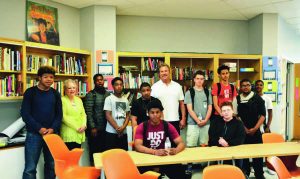Ferndale Literacy Project : Jack Aronson
By Mary Meldrum
JACK ARONSON, WELL-KNOWN FOUNDER OF GARDEN FRESH GOURMET in Ferndale, remembers people who would come into his shop to apply for a job, and had to bring their sister or their mother or a friend because they could not read, write or comprehend the application. They needed help with the very fundamentals of securing a job. That stuck with him.
Now, after both growing and selling their business, Jack and Annette Aronson have formed a foundation of their own and they are throwing a large amount of their money, almost all of their time, and a colossal amount of energy toward local literacy programs. Their level of giving back to Ferndale and the surrounding area is stunning.
Jack is chairman of the board for the non-profit Beyond Basics, which is a 501(c)(3) student-centered, literacy non-profit, serving st udents in Detroit public schools since 2002. Jack and Annette are also the driving force behind the younger program, The Ferndale Literacy Project, in Ferndale High School.
udents in Detroit public schools since 2002. Jack and Annette are also the driving force behind the younger program, The Ferndale Literacy Project, in Ferndale High School.
With as much as 60 per cent of Ferndale High School’s student population migrating from surrounding communities, Ferndale has been overwhelmed with students who arrive reading several grade levels below where they are supposed to be. The Ferndale Literacy Project is designed to address that.
“Reading is the springboard for everything,” contends Jack. He is passionate about helping kids to get on the right track early. Speaking to the skill levels in our country, he adds, “Reading in the United States is a catastrophe right now.”
He is right. In a study conducted by the U.S. Department of Education and the National Institute of Literacy, it was estimated in 2013 that approximately 32 million adults in the U.S. can’t read, and 21 per cent of adults read below a fifth grade level. And worse, 19 per cent of high school graduates cannot read. It has not improved since
2013.
Locally, the Detroit Regional Workforce Fund reports that 47 per cent of people in Detroit are illiterate. In nearby suburbs, up to one-third are functionally illiterate. That 47 per cent represents approximately 200,000 souls who have significant trouble with reading, speaking, writing and computational skills – everything a person needs to function in this world as a productive adult.
Within the tri-county region, there are a number of municipalities with illiteracy rates rivaling Detroit: Southfield at 24 per cent, Warren at 17 per cent and Pontiac at 34 per cent.
Nationwide, as much as 85 per cent of all juveniles who interface with the juvenile court system are functionally illiterate, and over 70 per cent of inmates in America’s prisons cannot read above a fourth grade level. That means a full two-thirds or more of students who cannot read proficiently by the end of fourth grade will end up in jail, in continuous conflict with the law, and/or on welfare. They can’t get jobs; they can’t get mortgages or cars and are mostly doomed to remain under-educated and flounder in poverty.
It is thought that low literary costs $73 million per year in terms of direct health care costs, but a recent study by Pfizer put the cost much higher. Factors that contribute to illiteracy include poverty, parental involvement (or lack thereof), domestic violence and other overarching life crises that are out of the control of the student.
This is not about stupidity. This is about circumstances, and often those circumstances include a multi-generational problem – a legacy of illiteracy. Parents who cannot read themselves cannot teach their children to read, or help them with homework, or demonstrate to them what a life of literacy would look like. Many are children who grow up without a single book in their house; nobody has ever read to them; nobody has ever read them a bedtime story.
But most of these students want help. They ache for success, and they realize that they can never achieve it without the basic skill of reading.
In the report from the Detroit Regional Workforce Fund, they place a particular focus on the lack of resources available to those hoping to better educate themselves, and that fewer than 10 per cent of those in need of help are actually receiving it.
If you can connect the dots, all this highlights in a dramatic way that this is not a problem . . . this is The Problem. This is the national crisis at the crux of everything that is going wrong in our country. Those who cannot read are screwed — and so are we if we don’t step up and help them.
Recovery of literacy in our youth is paramount to a better community and a better life for everyone. Jack Aronson understands the enormous burden illiteracy places on society, and the costly repercussions of standing by and not pitching in to change outcomes for the children in our community.
Ferndale Literacy Project
Stephanie Scobie is the reading specialist who has been hired to run the Ferndale Literacy Project which is embedded inside Ferndale High School and funded through the Ferndale school system. As they approach the end of their maiden year with 50 students enrolled in the program, she expresses that there has been some great progress and success so far.
“One student tested at the third-grade reading level at the beginning of the year, and in March of this year he is now reading at the eighth-grade level,” she smiles. That same tenth-grade student will be tested again before school lets out for the summer, and there is reason to believe he will be reading at the ninth-grade level by June. Stephanie goes on to describe how his progress in reading has changed this young man’s outlook, his self-confidence, and his actual physical presentation.
“He actually walks taller now and doesn’t hunch over anymore.”
People who can read generally take it for granted, but for those who cannot read or who struggle, illiteracy amounts to being ashamed of your mind. That shame is exquisitely painful for children in school when they are asked to read in front of the class, or when they bring home failing grades semester after semester, while their classmates can brag about getting As and Bs.
Children who are ashamed of their inability to read tend to avoid reading because it makes them feel terrible and embarrassed. There is a real fear in these children that they are not smart. Fear, shame, embarrassment, frustration and confusion all inhibit the ability for students to learn under normal circumstances. Add to this the other burdens of poverty, possible poor health and maybe not knowing where their next meal is coming from, and it is little wonder these kids can’t concentrate on a pop quiz or finish homework. Many are just navigating life by the seat of their pants every day with little security and nobody coming to their rescue.
The Ferndale Literacy program researched and invested in Vanderbuilt University’s computerized reading program, Read 180, which allows students to choose a topic they are interested in and it individualizes the stories to the child’s reading level.
Ferndale High School has dedicated a large room for its literacy project. Jack and Annette Aronson put up the money, and hired a team that has come in and painted and organized and stocked the space. They made it a clean, updated the room with new chairs and desks, shelves, books, white boards and markers. Part of the room is designed as a coffee and lounging space with several new armchairs. Once a month Jack and Annette bring in lunch for the kids, and several times a month snacks are available in the coffee and lounge area. Today the lunch consists of pizza, chicken, subs, cookies, chips and water bottles.
Children can relax and listen to their Read 180 program. This room is their haven and represents an amazing opportunity for these students to transform their lives and their future. The ability to read will not only impact their families, but also the trajectory of their lives, and they seem to know it.
Boots on the Ground . . . Your Boots
This program is young and, although they are experiencing good progress after only one year, it needs a lot of support. Jack and Annette Aronson’s foundation has contributed $100,000 to the Ferndale School System to launch and support this program, and to date, it has only 50 children enrolled. This Fall they hope to enroll 100 high school students into the literacy project. To handle that increase, more funding must be secured. Jack and Annette are asking for your help. Please contact Carol Jackson at cjackson0205@gmail.com to find out how you can get involved and make a difference. Goals can be reached if many contribute at least a little. The money donated to the Ferndale Literacy Project is passed through entirely. There are no administration costs involved, so every dollar has a direct impact. They are in the process of putting together a system where donors can make a smaller monthly contribution of $5 or $10 or $25 with an automatic withdrawal. In the meantime, please also consider making a larger donation, or ask about how you can volunteer your time to become a book buddy, a tutor or a mentor.
Another way you can help is to go to the Ferndale Literacy Project Facebook Page and like and share the heck out of the posts that come across your newsfeed. Help to spread awareness of the program. If you have some free time and any skills that might be of use to this organization, please contact Carol Jackson at the email address above.
This program is not only advancing the reading skills of students today, but helping the students to experience the joy of reading. With our help, they can break the cycle of multi-generational illiteracy and will ‘pay forward’ what they have learned to their children and community in the years to come.
These students are the pathway to successful futures in business, education, politics and community. Please help fund this project so it will continue for years to come. Any and all donations, no matter the size, are graciously accepted.



